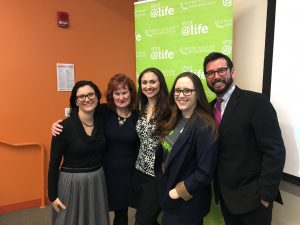
Dr. LaVonne Downey (second from left) with Shot@Life staff at a Chicago Champion training event in April 2016
How did you first become involved with Shot@Life?
I was recruited to start a chapter at Roosevelt University by the then United Nations Association-Chicago president Claudia Jaccaro. She asked me to speak at a panel about immunizations with a focus on national non-vaccination issues and how that related to the global efforts. I have been involved with Shot@Life ever since.
As a health expert, can you tell us more about the importance of vaccines in world health?
Vaccines are amazingly important to world health. In part because they have the greatest impact on reducing the burden of infectious disease. It is a cost effective solution and has a multiplier effect, in that the lives saved and disabilities prevented by immunizations positively impacts a country’s economic growth. They serve as an insurance policy protecting not just the individual but also the community as a whole, as the higher levels of immunization increase herd immunity. Herd immunity acts like a moat around a castle.
We know that you work with your students to support the Shot@Life campaign. Tell us about working with students for Shot@Life. What kind of unique experiences have you had, and what achievements have you accomplished?
I have the privilege of teaching and working with some of the best students. They all want to make a difference and use their range of talents to improve life for everyone. They may not all come with an understanding of public health, health policy, and/or global health but once they learn about it they understand the role it plays and how impactful it is on all aspects of an individual’s life. They have all stepped up to the plate and fully engaged in a range of activities. This often means they do advocacy work, such as talking to Senators, which is well outside of their comfort zone. The best part is to see how they internalize these issues and promote the concept that everyone deserves an equal shot at life; that where you were born should not dictate whether you live or die.
We noticed you are conducting research in the urban underdeveloped, and mentioned the importance of prevention. Could you explain to us what important role prevention plays in good health?
Good health comes not just from receiving quality medical care but from stopping disease before it starts. Many of the leading causes of death in the US and abroad can be prevented. If we build healthy communities and environments for people we can encourage prevention measures and enable people to live healthier and more productive lives. Preventive health strives to provide people with the tools they need to make healthier decisions about their own lives and, in turn, become more involved and empowered managers of their community’s environment. The more we build this infrastructure of health and engage individuals and communities, the healthier we will become. Immunizations are one of the vital cornerstones of preventive health.
How do the classes you teach (such as Public Health Issues, Economic Issues in Health Services, U.S Congress, Medical Ethics, Global Urban Health Policy, etc.) relate to the big picture of achieving SDG #3, good health and wellbeing for all?
All my classes illustrate how goal three, which aims to ensure healthy lives for all ages, is connected and intertwined with all the SDGs. The production of health is a complex mixture of inputs, whose impact and importance cannot be overstated. This is because health produces both economic and social growth. Without healthy lives for all ages we will not be able to build on the success of the Millennium Development Goals and add to the continued growth and development of all people in all nations. They learn how achieving the SDGs is not just about low income countries but are relevant for the higher income countries such as the United States. Without good health the ability to be productive at any level either within your family, academically or in the larger economy is diminished. Thus, good health is the cornerstone upon which all other SDGs rest or support.
